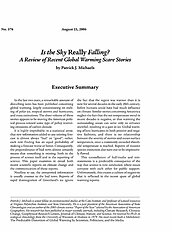In the last two years, a remarkable amount of disturbing news has been published concerning global warming, largely concentrating on melting of polar ice, tropical storms and hurricanes, and mass extinctions. The sheer volume of these stories appears to be moving the American political process toward some type of policy restricting emissions of carbon dioxide.
It is highly improbable, in a statistical sense, that new information added to any existing forecast is almost always “bad” or “good”; rather, each new finding has an equal probability of making a forecast worse or better. Consequently, the preponderance of bad news almost certainly means that something is missing, both in the process of science itself and in the reporting of science. This paper examines in detail both recent scientific reports on climate change and the communication of those reports.
Needless to say, the unreported information is usually counter to the bad news. Reports of rapid disintegration of Greenland’s ice ignore the fact that the region was warmer than it is now for several decades in the early 20th century, before humans could have had much influence on climate. Similar stories concerning Antarctica neglect the fact that the net temperature trend in recent decades is negative, or that warming the surrounding ocean can serve only to enhance snowfall, resulting in a gain in ice. Global warming affects hurricanes in both positive and negative fashions, and there is no relationship between the severity of storms and ocean-surface temperature, once a commonly exceeded threshold temperature is reached. Reports of massive species extinction also turn out to be impressively flawed.
This constellation of half-truths and misstatements is a predictable consequence of the way that science is now conducted, where issues compete with each other for public support. Unfortunately, this creates a culture of negativity that is reflected in the recent spate of global warming reports.

This work is licensed under a Creative Commons Attribution-NonCommercial-ShareAlike 4.0 International License.

